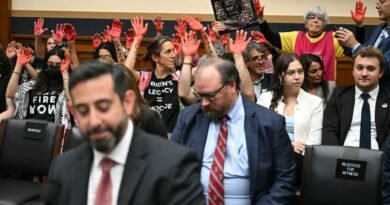Mayor Adams’ Track Record is Mixed as Re-Election Campaign Kicks Off

As Mayor Adams embarks on his re-election year, he faces a challenging backdrop, marred by a federal corruption trial and a denial (at least for the time being) of public matching campaign funds, putting him at considerable risk in both the June 24 primary and the Nov. 4 general election — particularly should a strong Republican contender emerge.
Nevertheless, he may still triumph, considering his opponents thus far appear to be a group of far-left candidates with policies that could be described as worse, promoting ideas like the legalization of prostitution, banning rent hikes, and making public transit free.
These opponents are banking on legal troubles to bring him down, yet the evidence against him seems weak, and the case may have stemmed from the (outgoing) Biden administration’s frustration over his criticisms regarding the migrant crisis it created.
His clear enthusiasm for the city and consistent centrist approach might lead voters to view him as the best option available.
On the topics of public safety and education, as well as addressing the “pro-Palestinian” extremists and the migrant crisis, his rhetoric has been largely appropriate.
Unfortunately, his policy implementation has often fallen short.
Regarding public safety, while he has overseen modest declines in overall crime (a 5.4% decrease last year), he has yet to restore Gotham to its pre-pandemic state.
Moreover, issues such as the abundance of locked-up toothpaste and the high number of addicts and severe mental health cases affecting numerous public spaces not only diminish New Yorkers’ quality of life but also indicate that the city is significantly unsafe.
While state and city lawmakers contribute greatly to crime issues, Adams’ management of NYPD leadership has been considerably problematic.
Deputy Mayor Phil Banks appeared to be in control until his recent departure, leading Commissioner Keechant Sewell to resign rather than continue the charade. Edwin Cabán then took over but also left under dubious circumstances, while Jeffrey Maddrey, who has since faced scandal, was elevated to chief of department.
Police Commissioner Jessica Tisch has made a strong start, but it took Adams nearly three years to appoint a commissioner with both genuine authority and promise — during which he also permitted the police force to shrink when it should have been expanding.
Another area of concern for public safety is the Administration for Children’s Services, where Adams has allowed Jess Dannhauser to implement politically correct policies that endanger children’s lives.
Additionally, the mayor has shown hesitancy as a leader in public education. Former Chancellor David Banks was unable to entirely reverse several anti-merit policies instituted during the de Blasio administration and did not eliminate the bureaucratic inefficiencies he himself criticized.
The introduction of a phonics-based reading program was undermined by mismanagement from the Department of Education, and the anticipated ban on student cell phones has fallen through.
Meanwhile, the United Federation of Teachers has consistently outmaneuvered City Hall, leveraging its influence in Albany to weaken mayoral control and promote an excessively costly class-size law.
At least the mayor successfully got the city Panel for Education Policy to approve the contract for the race-blind admissions test for the city’s specialized high schools — a commendable move he supports for fostering academic excellence.
However, despite the initial cheers for his acknowledgment of Washington’s role in the migrant crisis, Adams’ management of this issue has been inconsistent, treating it as an “emergency” for contracting reasons long after the initial shock had passed and taking an excessive amount of time to contest the notion that the city should apply the same “right to shelter” rules as for conventional homelessness.
Indeed, the mayor has achieved notable victories, such as removing vendors from the Brooklyn Bridge when unlicensed sellers created serious safety concerns, shutting down over 180 illegal smoke shops, implementing 24/7 speed cameras, and relocating more than 7,000 homeless individuals into shelters through his Subway Safety Plan.
The city has regained all private-sector jobs lost during the pandemic and added 300,000 new jobs since 2022, with tourism returning to pre-COVID levels as well.
Furthermore, he has reformed the city’s zoning code for the first time since 1961 through the $5 billion “City of Yes” initiative, which aims to foster new industries, revitalize vacant storefronts, and stimulate new housing construction.
We respect that Eric Adams is a “grown-up Democrat” who is not afraid to cross party lines, even while his coalition includes New Yorkers who hold vastly different views from our own.
Yet, he has frequently governed as if the role of mayor is merely a slightly elevated borough president, relying on a small circle of long-time associates.
As he presents his case for re-election, we hope he will be candid about what he has learned from his experiences and provide solid reasons for the city to trust he will deliver more effectively during a second term.
Mayor Adams’ intentions have always been in the right place; we hope he can assure voters that his actions are becoming increasingly reliable.



